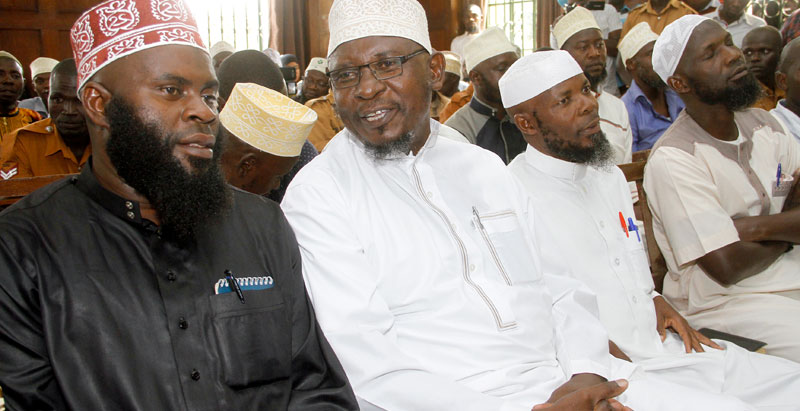The leader of the Tabliq muslim sect in Uganda Sheikh Yunus Kamoga and three others were this week sentenced to life imprisonment by a panel of three judges of the High Court of Uganda for committing acts of terrorism.
Court presided over by the panel led by Justice Ezekiel Muhanguzi also sentenced Siraje Kawooya, and Sheikh Fahad Kalungi to life imprisonment along with Kamoga. Court however acquitted Kamoga and 13 others on charges of murder.
Court also sentenced two others Kakande Yusufu aka Abdallah and Sekayaja Abdulsalam aka Kassim Mulumba to thirty years imprisonment on terrorism charges. Seven others were acquitted on terrorism charges.
But the ruling has stirred controversy and condemnation among the legal fraternity and the general public for the fact that it can set a dangerous precedence where people can be jailed for mere words.
Legal experts including renowned criminal lawyer Caleb Alaka have argued that the ruling ignored the fact that in such a capital offense, prosecution had to go beyond mere intent, to demonstrate that the defendants actually took actions to cause the death of people.
Judges ruled on the basis that Kamoga and his colleagues held meetings and printed fliers threatening violence against their opponents.
The judges who included Justice Jane Kiggundu and Percy Night Tuhaise said that Kamoga and three others committed very serious crimes by holding meetings and airing threats against people. They said that although they could not pin the murder of the late Sheikhs Mustafa Bahiga and Hassan Kirya, their words would have caused the murders of the late muslim clerics.
Court heard that Kamoga and aliases printed documents bearing the names of people, some of whom were later killed. Among those that were targeted included Prince Kassim Nakibinge, Najib Sonko, the late Mustafa Bahiga, late Hasan Kirya and Haruna Jemba among others.
Sheikhs Mustafa Bahiga and Hasan Kirya were subsequently gunned down in 2014 and 2015 respectively. They are some of the estimated eight muslim clerics that were killed between 2011 and 2016.
Although court didn’t not convict Kamoga and his accomplices on a charge of murder as had been demanded by prosecution, Justice Muhanguzi said that terrorism is a very serious offense and that the sentence was a befitting punishment to keep the offenders away from society.
Justice Muhanguzi said: “It is our finding that prosecution has proved that acts of terrorism were intended to intimidate the public for a religious, political, economic and social gain.”
Court however declined to accept the dying declaration of the son of the late Sheikh Bahiga who had alleged that Kamoga was behind his death.
The judge said: “The question of who killed Bahiga is not clear. We find that there was no collaboration. For this reason we are unable to clarify the evidence.”
Kamoga’s lawyer Fred Muwema said they will file an appeal against the sentence within 14 days. The Sunrise has learned that other local and international human rights defenders have expressed interest in joining Muwema to strike down the harsh sentence because of its precedence-setting implications.








